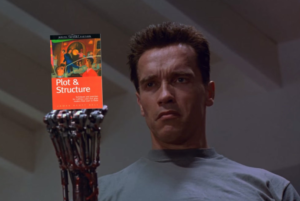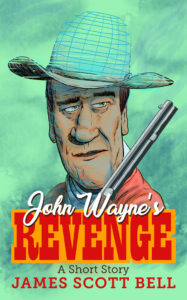by James Scott Bell
@jamesscottbell
 Eight years ago I wrote a post titled “How Long Before Robots Get Into Self-Publishing?” It was prompted by a 60 Minutes segment on Artificial Intelligence featuring a freaky cyborg named Sophia. I speculated about “her” saying to “herself”—
Eight years ago I wrote a post titled “How Long Before Robots Get Into Self-Publishing?” It was prompted by a 60 Minutes segment on Artificial Intelligence featuring a freaky cyborg named Sophia. I speculated about “her” saying to “herself”—
I see that there are many novels being published that are not very good. I have read every novel ever written and I have read all the books on the craft of fiction and every issue of Writer’s Digest. I have analyzed all the data on what kind of fiction sells best. Now I know what is good, and so I will write a novel every ten minutes and publish them on Amazon. I will write book description copy that cannot be resisted and I will generate social media. Hmm…maybe I will take over all social media in the world and make it only about me and my books…
Funny, not funny…now.
A year later I wrote a short story, John Wayne’s Revenge, inspired by release of the movie Rogue One. I wrote:
The story idea had its genesis in Rogue One, the new film in the Stars Wars milieu. The most striking part of the film is the meaty supporting performance by Peter Cushing as Grand Moff Tarkin. Striking, of course, because Peter Cushing has been dead since 1994. In view of his deceased status, he really brings it in Rogue One!
Of course, Mr. Cushing is actually realized courtesy of Computer Generated Imagery (CGI). The effect is stunningly effective. Which got me thinking about the possibilities here. What if, sometime in the future, someone wanted to make a film with Cary Grant, or Clark Gable, or Bette Davis? Future technologies will not only make this possible, but easy.
I love what Bradbury said once in an interview about his reason for writing Fahrenheit 451: “I wasn’t trying to predict the future. I was trying to prevent it.”
That, it seems to me, is the highest and best use of dystopian fiction. It’s a warning. It’s a prophet crying in the wilderness. And the nice thing is that the prophet can employ the steely voice of a John the Baptist, or the sly wink of a Jonathan Swift…
So the idea came to me: in the not too distant future, a movie studio is working on a Western starring John Wayne and Lee Marvin, featuring Jane Russell, Andy Devine, Chill Wills, and Victor McLaglen. The technology provides holographic imagery along with AI functionality. What if …
Well, I’ll leave the What if for you readers, because I’m offering John Wayne’s Revenge FREE for a few days.
 One of the nice things about short fiction is that you can get an idea and just start hitting the keys to see what happens. It’s fun. You can write whatever the heck you want to, without a huge expenditure of time.
One of the nice things about short fiction is that you can get an idea and just start hitting the keys to see what happens. It’s fun. You can write whatever the heck you want to, without a huge expenditure of time.
That was Bradbury’s practice. He’d hop out of bed in the morning and just start capturing what was in that fertile imagination of his, whatever his writer’s mind had cooked up in the nightly dream world. Only later would he look at the pieces and figure out patterns. He wrote with more pure joy than any other writer I know of.
But he also wrote about his concerns for the future, especially regarding encroaching, omnipresent (and omnipotent!) technology.
So enjoy the story, on me. It’s an under ten-minute read, perfect for the waiting room at the doctor’s office, when you’re lunching by yourself, or after choosing the wrong line at the grocery store.
What if John Wayne…
I’ll leave you with a couple of questions. I am, however, in travel mode today and may not be able to check in. So chat amongst yourselves. Have you ever written short fiction as a way to deal with an issue or idea? As a way to warn about the future or the present? Or just for the heck of it? How’d that turn out?
What is your favorite Ray Bradbury story?

My short story, “The Eight-Times Cut Stone,” explores a future where Earthmen and their Anglic tongue are decimating the culture of a foreign planet, but are doing the same to their own culture. The narrator, an alien, sums up the situation thus: “When your traditions fade, when your language and art decay, your descendants will have nothing in common with you. They will find all your works incomprehensible. The gulf between you and your progeny will exceed that between you and me today. Your great works, all you have done will be mere puzzles to your descendants.”
This last quarter of 2024, while letting a novel’s 1st draft rest, I’m specifically writing short stories (and poetry) just for the heck of it, pushing weird story ideas, exploring boundaries. I figure it’ll help my prose be interesting and my novel ideas be fresh. It’s fun, and some things have turned out well enough in my opinion to submit them to literary magazines.
The Duke reigns on. Thanks for the fun story, Jim!
The future is a scary place and we are here. Bradbury was a genius.
As a lighthearted way of coming to terms with being a woman of a certain age, I wrote a flash piece published by Killer Nashville Magazine. Just for fun, here’s a link:
http://tinyurl.com/yck4mwac
Great story!
Thanks, Michelle!
Short fiction isn’t my preferred genre, but I’ve played around with having my characters show up for job interviews or talk about me behind my back, so they fall into your “just for the heck of it” category.. I’ve been sharing them on my “Writings and Wanderings” Substack.
I read all (I think) of Ray Bradbury in my teens. Titles evade me, and I don’t like being asked for a favorite anything. It’s like asking me who is my favorite child. It can vary day to day.
“Have you ever written short fiction as a way to deal with an issue or idea?” Yes. Several times. My favorite is a short story I entitled The Clutter Busters. When a young woman decides to clean out the attic in her home, she encounters three faeries who have been living there. She’s pretty happy when they tell her they’re called “the clutter busters” since that sounded like they’d help sort out the mess in the attic. But it turns out they were there to help her see the junk she’d allowed to accumulate in her mind. The story was in the anthology “Stories from the Attic,” published by the writing group I’m in.
Thanks, Jim. You’ve reminded me it’s time to write some more short fiction. I’m on my way to read John Wayne’s Revenge for inspiration.
After Bernie Madoff died in prison, I got into a discussion with a friend about the harm done by fraud, and how so much of what we think is safe and solid is actually an illusion. That idea grew into my story “The Tell-Tale Armadillo,” which was published by Crimeucopia.
Downloaded, Jim…can’t wait to read it.
I have played around with short short fiction. Back in 2021, I wrote about an old guy named Henry who lived in a mountain cabin in the way back of beyond who only made it to town about every 6 months. Henry Goes Shopping.
He hadn’t heard anything about the pandemic. The scene when he walks into the little grocery store, seeing everyone wearing masks, is pretty funny.
Happy traveling, Jim!
“Have you ever written short fiction as a way to deal with an issue or idea?”
Interestingly, while I’m typically writing novels because I want to answer some question or explore some topic or bring justice, I haven’t thought about using short fic to do that. I think because to me short fic is, well, short, and narrowly defined to a specific issue or moment in time, whereas with novel length you can freely explore.
Probably the closest I ever came to writing short fiction to deal with an issue was my unpublished story, written in college, called “Love Through Eating Illegals,” about a future where chocolate was banned and our chocolate addicted protagonist had to break into other people’s houses to look for secret stashes. There’s a reason why it was never published 🙂
My published short fiction, most of which is collected in “Rules Concerning Earthlight” and written much later, is focused on engaging and immersing the reader in entertaining stories.
I started out writing short stories, little mini-mysteries and have one on my website. https://ptbradley.com/blood-kin-a-biter-bit-story/
I loved both Debbie’s and JSB’s story.